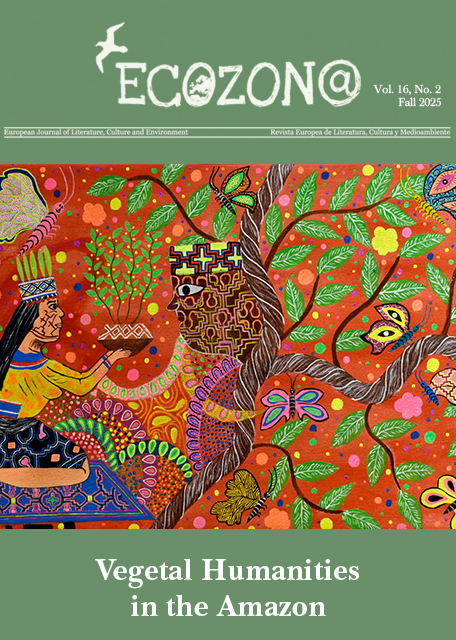Botany as the Path to Awareness, or the Flower as a Grail In Thomas Wharton's Icefields
DOI:
https://doi.org/10.37536/ECOZONA.2011.2.2.427Abstract
In the novel Icefields by Canadian novelist Thomas Wharton, plants are more than incidental elements. Vegetation appears as a living form of writing in nature that enables men and women to understand life and their relationship to the world. It can also be seen as the Grail that the alpinist sets out to find and that reveals the need to leave plants in place and not destroy the environment for motives of profit. This paper aims to show that the imagination may convey an ecological message and that ecological consciousness may lead to metaphysical awareness.
En la novela Icefields, del autor canadiense Thomas Wharton, el mundo vegetal es algo más que un elemento accesorio. La vegetación parece ser una forma viva de escritura de la naturaleza que permite a los hombres y a las mujeres entender la vida y su relación con el mundo. Puede también considerarse como un Grial que el alpinista busca y que le revelará la necesidad de dejar que la planta crezca en su medio ambiente sin destruir el mismo con miras mercantiles. Este artículo trata de mostrar que la imaginación puede ser un medio para comunicar un mensaje ecológico y que una conciencia ecológica puede llevarnos a una conciencia metafísica.
Downloads
##submission.downloads##
Pubblicato
Fascicolo
Sezione
Licenza
Authors who publish with this journal agree to the following terms:
a) Authors retain copyright and grant the journal right of first publication with the work simultaneously licensed under a Creative Commons Attribution License that allows others to share the work with an acknowledgement of the work's authorship and initial publication in this journal (CC BY-NC for articles and CC BY-NC-ND for creative work, unless author requests otherwise.
b) Authors are able to enter into separate, additional contractual arrangements for the non-exclusive distribution of the journal's published version of the work (e.g., post it to an institutional repository or publish it in a book), with an acknowledgement of its initial publication in this journal.
c) Authors are permitted and encouraged to post their work online (e.g., in institutional repositories or on their website) prior to and during the submission process, as it can lead to productive exchanges, as well as earlier and greater citation of published work (See The Effect of Open Access).










